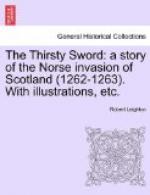Kenric looked round at the tall fair maiden. She was radiant with the beauty of strength. Her long red hair streamed in the breeze, and her rosy cheeks glowed with the healthy blood that coursed under her smooth clear skin. Her eyes were limpid as the summer sky.
“What news may that be, Aasta?” asked the young king.
“It is,” said she, “that your isle of Gigha has been invaded and conquered by the Norsemen, and that your kinsman William MacAlpin has but now given up his life in telling me the tale.”
Kenric stood in troubled thought, a cloud upon his brow.
“Where is Lulach?” he presently asked.
“Over at Inch Marnock,” she said, “and ill with his foot that he hurt in climbing the rocks two days since. He cannot walk but with pain, or I might have sent him to you.”
“That is most unfortunate,” said Kenric, “for saving Lulach and myself there is none in the island who can speak the Norse tongue. I would have sent him to Gigha to learn the truth of this you tell, and to discover if there be further danger.”
“You forget, my lord, that it was I who taught Lulach the Norse tongue,” said Aasta. “And cannot I do this mission as well as he? Give me your bidding, my lord, and though I die in fulfilling it, yet will I deem my life a small sacrifice if it be that I can serve you.”
Then Kenric’s eyes lighted up, and he looked admiringly upon the fearless girl.
“Aasta,” said he, “I will take your service, and I will even go with you to Gigha this very day. Meet me at St. Ninian’s two hours before sunset. Have ready a fishing coracle with some fish, and dress you as a fisher maid. These are my orders. Go.”
At sunset that evening a little boat, paddled by a stalwart young man in the rough habit of a fisher, was crossing the waters of Loch Fyne.
He was singing a plaintive Gaelic song, and a fair maid, whose deep red hair was covered by a coarse blue cloak, joined in the wild strain with notes that were as the sweet song of the night bird of the far south. The youth was Earl Kenric of Bute; the maiden was Aasta the Fair.
Crossing from Ardlamont Point, they crept up the opposite shores of Kintyre until they came to a wide bay upon whose banks lies the little fishing village of Tarbert. In the growing darkness Kenric paddled the boat inward to the extreme end of this bay. Had he been in less hurry he might have reached the isle of Gigha by taking a larger craft and sailing down Kilbrannan Sound and so round the Mull of Kintyre, by the way he had gone with the galleys. But he now adopted a speedier way and a much safer one. The great peninsula of Kintyre, which at the north joins to Knapdale, forms at Tarbert a narrow isthmus of but a mile broad. Landing at the head of Tarbert Bay, Kenric bade Aasta carry the paddles and her basket of fish, and himself taking up the little boat in his two strong arms and raising it upon his back, he thus crossed the mile of dry land. The boat was but a light one, built of pine ribs and covered with hide, and his task was less difficult than it might seem.




